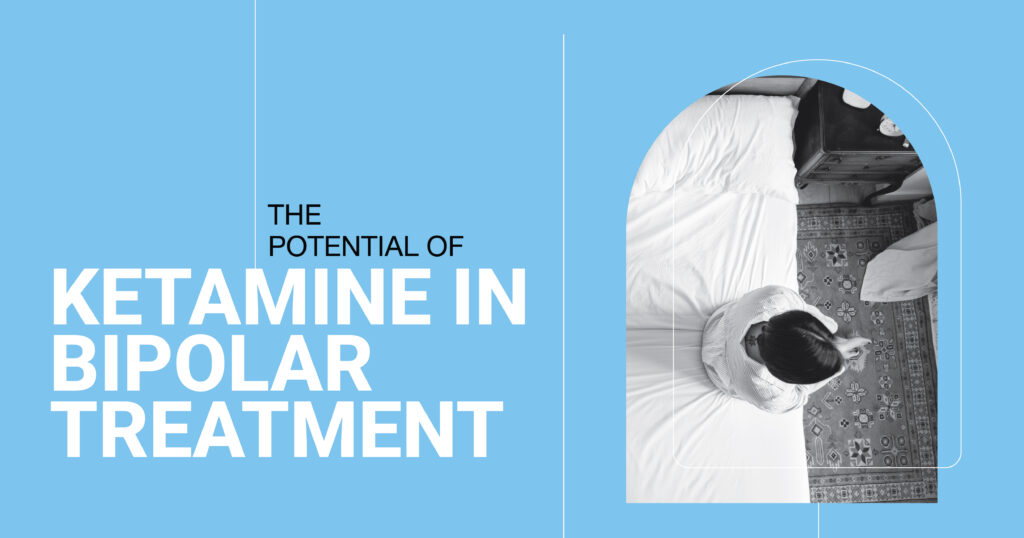Bipolar disorder is a mental health condition that causes extreme mood swings, including manic and depressive episodes. Traditional treatments such as mood stabilizers and antidepressants can be effective, but they may not work for everyone. For individuals with treatment-resistant bipolar disorder, ketamine treatment for bipolar offers a promising alternative. Ketamine, initially used as an anesthetic, has gained recognition for its ability to provide rapid relief in mood disorders, including bipolar disorder. In this article, we will explore how ketamine can be used for bipolar treatment, its effectiveness in managing symptoms, and the future potential of ketamine therapy.
How Ketamine Works in Bipolar Disorder Treatment
Ketamine’s effects on bipolar disorder are tied to its unique action on the brain. Unlike traditional medications, ketamine treatment for bipolar works rapidly by affecting the brain’s glutamate system. This system regulates mood and emotional responses, and ketamine helps to rebalance it, often leading to a quick improvement in mood. Ketamine is thought to work by promoting the growth of new synapses, facilitating better communication between brain cells, and enhancing brain plasticity. This is a key factor in the effectiveness of ketamine, especially in people who haven’t responded well to traditional treatments. Here are how ketamine acts in the brain:
- Rapid Onset. Ketamine’s effects can be felt within hours of administration, offering quick relief from depressive symptoms.
- Brain Rebalancing. Ketamine helps reset brain activity, which can be helpful in stabilizing mood.
- Unique Mechanism. Ketamine doesn’t just target serotonin or dopamine; it works through glutamate receptors, allowing it to treat symptoms differently.
The Role of Ketamine in Managing Bipolar Depression
For many individuals with bipolar disorder, depression is the most challenging phase. The depressive episodes can last for weeks or even months, significantly impacting daily life. Ketamine therapy for bipolar disorder is particularly beneficial for those who experience prolonged depressive states and find no relief from standard antidepressants. Ketamine’s rapid action on mood can provide immediate support, offering a break from intense depressive symptoms.Here’s how ketamine helps manage bipolar depression:

- Fast Acting. Ketamine offers rapid relief bipolar ketamine, often within hours, helping to alleviate depressive feelings before they intensify.
- Targeting Resistant Symptoms. It works well for patients with treatment-resistant depression, providing hope when other medications fail.
Ketamine Infusion Therapy for Bipolar Disorder
Ketamine infusion therapy involves the administration of ketamine through an IV, allowing it to enter the bloodstream and quickly reach the brain. This method is commonly used for ketamine bipolar management and is increasingly becoming a go-to option for those struggling with severe bipolar depression. Infusions are typically administered in a controlled setting, with close monitoring by medical professionals to ensure patient safety.Here’s why ketamine infusion therapy is effective:
- IV Infusions. Ketamine is delivered directly into the bloodstream for fast and efficient action.
- Controlled Environment. Infusion therapy takes place in a safe, clinical setting, ensuring patient comfort and monitoring.
- Multiple Sessions. Depending on the individual, a series of infusions may be necessary to achieve optimal results.
Rapid Relief for Treatment-Resistant Bipolar Depression with Ketamine
One of the most promising aspects of ketamine treatment for bipolar disorder is its ability to provide rapid relief for treatment-resistant bipolar depression. Many patients who have not found success with traditional medications, such as mood stabilizers or antidepressants, turn to ketamine for its effectiveness in providing quick relief from severe depressive episodes. Research indicates that ketamine can alleviate symptoms within hours, providing hope for those who have been living with the debilitating effects of bipolar depression. Here are the key reasons why ketamine is so effective in treatment-resistant cases:
- Effective for Treatment Resistance. Ketamine infusion for bipolar disorder can bring relief when other treatments have failed.
- Improvement in Symptoms. Patients often report feeling better within hours after their first infusion.
Ketamine’s Impact on Bipolar Mood Stabilization
Bipolar disorder is characterized by extreme mood swings, and stabilizing mood is crucial for long-term management. Ketamine bipolar management can help reduce the frequency and intensity of mood swings, contributing to better overall stability. This is especially important for individuals who experience rapid cycling or have a high risk of relapse into depressive or manic episodes. Ketamine’s impact on the brain helps to stabilize mood by restoring balance in the neural pathways involved in emotional regulation. Here’s how ketamine contributes to mood stabilization:
- Mood Regulation. Ketamine helps to normalize brain activity, potentially reducing the frequency of mood swings.
- Long-Term Benefits. When used in combination with other treatments, ketamine therapy may contribute to long-term stability in bipolar disorder management.
Current Ketamine Clinical Trials for Bipolar Disorder
Ongoing clinical trials are exploring the potential of ketamine as a treatment for bipolar disorder. These trials aim to understand its effectiveness, safety, and the best methods for administration. Several studies have shown promising results, with patients reporting rapid mood improvements and reduced depressive symptoms. However, further research is needed to fully understand its long-term benefits and any potential risks. Here’s what current trials are focused on:
- Research Focus. Clinical trials are exploring the most effective dosages and treatment schedules.
- Promising Results. Initial studies suggest that ketamine may offer significant benefits in mood stabilization for bipolar patients.
Future Directions in Ketamine Therapy for Bipolar Management
As more research is conducted, ketamine therapy for bipolar disorder is expected to evolve. The future may bring more personalized treatments, with ketamine being used alongside other therapeutic options to provide a comprehensive, tailored approach to managing bipolar disorder. Additionally, advancements in the delivery methods of ketamine, such as nasal sprays and oral formulations, could make treatment even more accessible. Here’s what we can expect moving forward:
- Personalized Care. Future therapies may offer customized treatments based on an individual’s response to ketamine.
- New Delivery Methods. Nasal sprays and oral treatments could make ketamine therapy easier and more convenient for patients.
Ketamine vs. Traditional Bipolar Treatments
| Treatment Type | Effectiveness | Onset of Action | Treatment Duration |
|---|---|---|---|
| Ketamine Therapy | High (fortreatment-resistant bipolar) | Rapid (hours to days) | Short-term with repeat sessions for longer benefits |
| Traditional Medications | Moderate to High | Gradual (weeks) | Ongoing, withadjustments needed over time |
| Psychotherapy | Moderate | Gradual (weeks to months) | Long-term, supportive |
Explore the Potential of Ketamine Treatment for Bipolar Disorder at Clear Mind Treatment
If you or someone you know is struggling with bipolar disorder, Clear Mind Treatment is here to help. We offer ketamine treatment for bipolar that provides hope to individuals who have not found relief through traditional methods. Our experienced team works closely with each patient to create a personalized treatment plan that addresses their unique needs. Whether you are dealing with treatment-resistant depression, rapid mood swings, or need a comprehensive management strategy, we are here to guide you through the process.
Contact Clear Mind Treatment today to learn more about how ketamine therapy for bipolar disorder can help you achieve long-term mental health stability.

FAQs
- What is the role of ketamine therapy in managing bipolar disorder?
Ketamine therapy helps by targeting the brain’s glutamate system, offering rapid relief for bipolar depression and stabilizing mood swings. It provides an alternative when traditional treatments fail, especially for those with treatment-resistant depression. By acting on neural pathways differently from common medications, ketamine offers a unique way to treat the root causes of mood instability.
- How does ketamine infusion therapy provide rapid relief for treatment-resistant bipolar depression?
Ketamine infusions act quickly by affecting brain pathways, providing immediate relief from severe depressive symptoms when other treatments fail.The rapid onset of ketamine’s effects is crucial for those in deep depressive states, where waiting for traditional medication to work can be unbearable. Infusion therapy offers a safe and controlled environment, maximizing its potential to restore emotional balance quickly.
- Can ketamine be effective for bipolar mood stabilization?
Yes, ketamine helps regulate brain activity, reducing the frequency of mood swings and promoting long-term stability in bipolar disorder.It supports mood stabilization by encouraging healthy neural connections and restoring balance in brain chemistry. This action can lead to fewer extreme highs and lows, offering greater control over emotional fluctuations and improving overall mental well-being.
- What are the latest findings from ketamine clinical trials focused on bipolar disorder?
Recent clinical trials show that ketamine may significantly improve mood in people with bipolar disorder, especially those with treatment-resistant depression.These studies highlight ketamine’s potential to reduce depressive episodes rapidly, offering patients a much-needed breakthrough when other medications have failed. Researchers are continuing to study its long-term benefits and any associated risks to ensure its safe and effective use.
- How does ketamine impact the management of bipolar depression compared to traditional treatments?
Unlike traditional medications, ketamine provides fast-acting relief and works by targeting different brain pathways, offering hope for those unresponsive to standard treatments.Traditional medications often take weeks to show effects, whereas ketamine works almost immediately, providing rapid symptom relief. This speed of action is crucial for individuals who experience severe and debilitating depressive episodes that last for extended periods.








